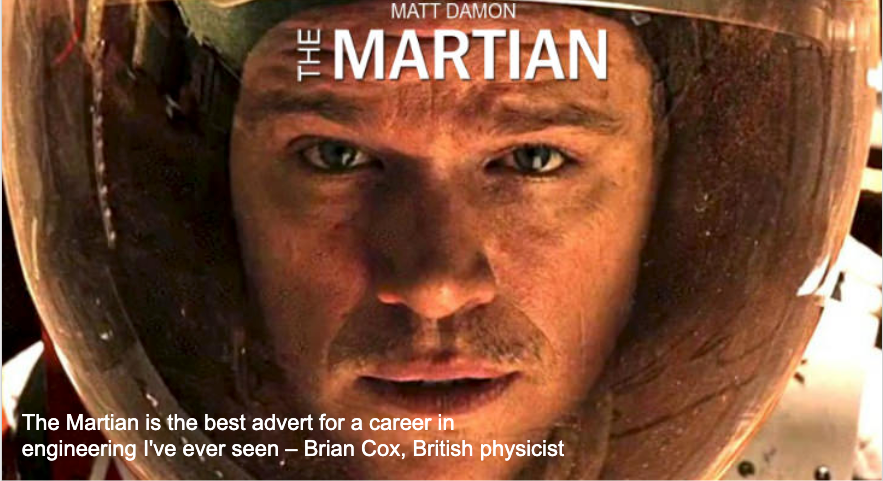
The Martian is my top favourite movie (and a book) that in action shows the excitement around engineering professions. Mark Watney, being left alone on Mars, fights for his life with all the knowledge and skills he has, from botany to chemistry and physics. Of all engineering professions, software engineering is probably the most booming right now in light of Artificial Intelligence breakthroughs. But does this profession have ethical aspects that we as engineers and humans need to be continuously thinking about?
I began to follow the work of Yuval Noah Harari and his call to the humanity on a potential big issue we are facing. It does not yet dawn at many of us to start thinking about potential threats to how we operate today. Many of us focus on day-to-day activities and may not have enough time to look beyond.
Right now I see two figures on the global scene that publicly speak with some urgency about AI, its potentially disruptive impact and change for the civilisation. Yuval Noah claims we are at a cross-road of getting new types of human beings, that will have supporting AI and biological improvements made to them. Elon Musk claims that AI is way smarter than human already (take Go) and we need to start thinking how to control it. And AI keeps improving for higher and higher degrees of freedom (from checkers, through chess, to Go it is a few orders of magnitude change in degrees of freedom each game allows). And so eventually AI will beat human beings in what is possible. One of the contemporary examples touching me personally is robots ironing clothes or wiping off coffee spills with high level of movement precision and similarity to that of humans:
Very excited to announce a project 3 years in the making: BLUE, a low-cost, safe, capable robot designed from the ground up with AI in mind.— Pieter Abbeel (@pabbeel) April 9, 2019
Want BLUE? You can now sign up for priority access here: https://t.co/bdK7ouRABK
Learn more here: https://t.co/vB0i39aHTE
w/@Cthephen pic.twitter.com/Ucxqyylzue
But I’m sure Musk and Harari mean more than that.
A simple example Harari gives is: the IoT devices will record your pulse / level of endorphines as you see your political leader and so the government will know, how happy and faithful you are towards your leadership. Or what ads to show you depending on your sexual orientation based on what you have written / read / watched (even well before you understand your orientation yourself).
When more and more AI powered robots will take away the routine tasks, we as humanity will have two development paths: wear complacency and become lazier or seek creativeness. The first path is always reachable, especially in the time when we would work 3 days a week, 4 hours a day (by Jack Ma’s prediction). Will AI thus become even more dominant and take the lead over humanity? As by Musk eventually AI will write its own software and will be way more efficient in it, than modern AI engineers. And at some point humans having slower interfaces to produce / consume data and knowledge will be left behind AI and it can turn into a catch up game.
Given these potential issues that automation with AI is posing, those of us who focus on automation and AI touch on the ethical boundaries of our work. If you will, we are participating in the launch and acceleration of an AI revolution, that might not be visible for all people on the Planet yet. But we need to be aware of changing the society fabrics through rewriting job markets, work skills in demand and allowing new types of human / robot elites control people around them with AI.
I would like to share a different perspective on revolutions, Planet-agnostic:
- Making an industry level revolution is hard. There are many reasons, one of which is simply human laziness. Who in their sane mind would want to change anything in the production process, when it is comfortable as is?
- The revolution force should be so strong, that it is able to cover individual and collective laziness / resistance and still be obvious to anyone involved, that it is a change for good.
- As we progress into the future, multiple of these (small and big) revolutions will make life easier and hence more lazy participants will emerge.
- When laziness saturates, what direction the next revolution will take and will it really optimise for making things globally sustainable (like climate or flying to Mars) or locally to cater to individual’s needs to make us even more complacent?
- This leaves true revolution breakthroughs to unsettled minds, challenging everything they see. Which makes such people highly uncomfortable for lazy ones to be around.
- And naturally, the unsettled minds don’t have much time to enjoy the results of their doing (assuming the time span of a revolution is less than their lifespan).
- Yet lazy will eventually benefit from these revolutions and become lazier.
- The question then is: how to optimise for a global goal, while making as many on the Planet involved to keep knowledge and revolution results more evenly distributed?
I thank Derek Kannenberg and Tatiana Batanina for reading drafts of this essay and providing constructive feedback and thoughts.
Originally published at https://www.linkedin.com.
No comments:
Post a Comment